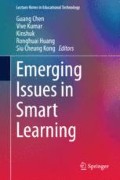Abstract
Traditional physics labs in high school suffer from slow data acquisition so that dynamic values of variables are hidden from students. Modern mobile devices such as Lego Mindstorms NXT, smartphones and Arduino can acquire data at a fast rate and can be used to measure dynamic variables in physics experiments. A case in point is the changing angle of a pendulum experiment. With a tool called InduLab, students in three groups using the mobile devices mentioned above in pendulum experiments collected data and built their model s with the data. Results reviewed the Arduino group achieved the highest success rate of building correct models, followed by the smartphone group and then the NXT group. This suggested that modern low-cost mobile devices can be used to improve physics labs in high school.
Access this chapter
Tax calculation will be finalised at checkout
Purchases are for personal use only
Preview
Unable to display preview. Download preview PDF.
References
Papert, S. Computer-based microworlds as incubators for powerful ideas. In R. Taylor (Ed.), The computer in the school: Tutor, tool, tutee (pp. 203–210). New York: Teacher’s College Press (1980).
White, B., & Frederiksen, J. A. A theoretical framework and approach for fostering metacognitive development. Educational Psychologist, 40(4), 211-223 (2005).
Wong, W. K., Xu, J. M., Chao, T. K. Using Android mobile device for physics experiments and inquiry, International Conference on Computers in Education, 2011/11/28-2011/12/02, APSCE, Chiangmai (2011).
Wong, W. K., Chao, T. K., Lien, Y. W., and Wu, C. J. Rediscovering scientific laws in high school physics labs with mobile devices, Proceedings of International Conference on Computers in Education, Asia-Pacific Society for Computers in Education, Singapore (2012).
Course phys350 of Queen’s University experiment document. http://www.physics.queensu.ca/~steve/phys350/Pendulum-quicksetupguide.pdf
A pendulum sensor kit from a commercial company IORodeo Smart Lab Technology. http://www.iorodeo.com/pendulum_lab
Acknowledgments
This study is supported by the Department of International Cooperation and Science Education, Ministry of Science and Technology, Taiwan under contract 101-2511-S-224-001- and 102-2511-S-224 -002 -MY2.
Author information
Authors and Affiliations
Corresponding author
Editor information
Editors and Affiliations
Rights and permissions
Copyright information
© 2015 Springer-Verlag Berlin Heidelberg
About this paper
Cite this paper
Wong, WK., Chao, TK., Chen, PR., Lien, YW., Wu, CJ. (2015). Mobile Devices and a Modelling Tool for Physics Experiments in High School. In: Chen, G., Kumar, V., Kinshuk, ., Huang, R., Kong, S. (eds) Emerging Issues in Smart Learning. Lecture Notes in Educational Technology. Springer, Berlin, Heidelberg. https://doi.org/10.1007/978-3-662-44188-6_33
Download citation
DOI: https://doi.org/10.1007/978-3-662-44188-6_33
Published:
Publisher Name: Springer, Berlin, Heidelberg
Print ISBN: 978-3-662-44187-9
Online ISBN: 978-3-662-44188-6
eBook Packages: Humanities, Social Sciences and LawSocial Sciences (R0)

